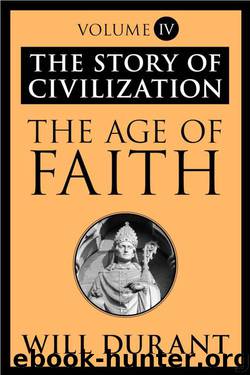The Age of Faith by Durant Will

Author:Durant, Will [Durant, Will]
Language: eng
Format: epub, mobi
Publisher: Simon & Schuster
Published: 2011-06-03T20:00:00+00:00
II. THE PROGRESS OF INDUSTRY
The development of industry kept pace with the expansion of commerce; wider markets stimulated production, and mounting production nourished trade.
Transport progressed least. Most medieval highways were avenues of dirt and dust or mud; no crown or culverts carried water from the road; holes and pools abounded; fords were many, bridges few. Burdens were carried on pack mules or horses rather than in carts, which could not so well avoid the holes. Carriages were large and clumsy, rode on iron tires, and had no springs;15 they were so uncomfortable, however ornate, that most men and women preferred to travel on horseback—both sexes astride. Until the twelfth century the maintenance of roads depended upon the owner of the adjoining property, who wondered why he should spend to mend what chiefly transients used. In the thirteenth century Frederick II, inspired by Moslem and Byzantine examples, ordered the repair of roads in Sicily and southern Italy; and about the same time the first “royal highways” were built in France—by laying stone cubes in a loose bed of earth or sand. In the same century the cities began to pave their central streets. Florence, Paris, London, and the Flemish towns built excellent bridges. In the twelfth century the Church organized religious fraternities for the repair or construction of bridges, and offered indulgences to those who shared in the work; such frères pontifs built the bridge at Avignon, which still preserves four arches from their hands. Some monastic orders, pre-eminently the Cistercians, toiled to keep roads and bridges functioning. From 1176 to 1209 king, clergy, and citizens contributed funds or labor to raising London Bridge; houses and a chapel rose over it, and twenty stone arches carried it across the Thames. Early in the thirteenth century the first known suspension bridge was thrown over a gorge in the St. Gotthard Pass of the Alps.
Roads being painful, waterways were popular, and played the leading role in the transport of goods. One boat could carry as much as 500 animals, and far more cheaply. From the Tagus to the Volga the rivers of Europe were its main highways, and their direction and outlets determined the spread of population, the growth of towns, and often national military policy. Canals were innumerable, though locks were unknown.
Whether by boat or by land, travel was arduous and slow. A bishop took twenty-nine days to go from Canterbury to Rome. Couriers with fresh relays of horses could make a hundred miles a day; but private couriers were costly, and the post (re-established in Italy in the twelfth century) was normally confined to government affairs. Here and there—as between London and Oxford or Winchester—a regular stagecoach service was available. News, like men, traveled slowly; intelligence of Barbarossa’s death in Cilicia took four months to reach Germany.16 Medieval man could eat his breakfast without being disturbed by the industriously collected calamities of the world; or those that came to his ken were fortunately too old for remedy.
Some advances were made in the harnessing of natural power.
Download
This site does not store any files on its server. We only index and link to content provided by other sites. Please contact the content providers to delete copyright contents if any and email us, we'll remove relevant links or contents immediately.
| Buddhism | Christianity |
| Ethnic & Tribal | General |
| Hinduism | Islam |
| Judaism | New Age, Mythology & Occult |
| Religion, Politics & State |
Cecilia; Or, Memoirs of an Heiress — Volume 1 by Fanny Burney(32554)
Cecilia; Or, Memoirs of an Heiress — Volume 2 by Fanny Burney(31951)
Cecilia; Or, Memoirs of an Heiress — Volume 3 by Fanny Burney(31935)
The Secret History by Donna Tartt(19067)
Sapiens: A Brief History of Humankind by Yuval Noah Harari(14376)
Leonardo da Vinci by Walter Isaacson(13323)
The Radium Girls by Kate Moore(12022)
Sapiens by Yuval Noah Harari(5368)
How Democracies Die by Steven Levitsky & Daniel Ziblatt(5217)
The Wind in My Hair by Masih Alinejad(5093)
Homo Deus: A Brief History of Tomorrow by Yuval Noah Harari(4911)
Endurance: Shackleton's Incredible Voyage by Alfred Lansing(4775)
Man's Search for Meaning by Viktor Frankl(4591)
The Silk Roads by Peter Frankopan(4528)
Millionaire: The Philanderer, Gambler, and Duelist Who Invented Modern Finance by Janet Gleeson(4473)
The Rape of Nanking by Iris Chang(4209)
Joan of Arc by Mary Gordon(4107)
The Motorcycle Diaries by Ernesto Che Guevara(4093)
Stalin by Stephen Kotkin(3963)
